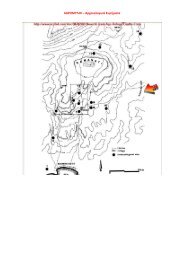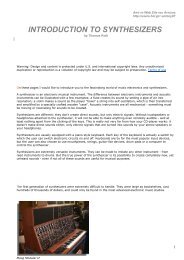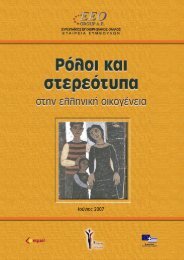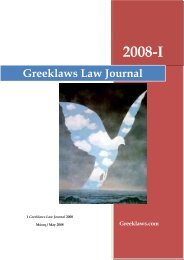BioNews 26 - pdf - Hol.gr
BioNews 26 - pdf - Hol.gr
BioNews 26 - pdf - Hol.gr
You also want an ePaper? Increase the reach of your titles
YUMPU automatically turns print PDFs into web optimized ePapers that Google loves.
page 8/Bio News BIO-LEGISLATION APRIL 2001<br />
INTERNATIONAL COURT<br />
Resolving the Environmental Crisis<br />
The Need for an International Court<br />
of the Environment<br />
Zappeion Hall, Athens<br />
Monday, January 22, 2001<br />
Conference Pro<strong>gr</strong>amme<br />
International Court of the Environment - Need and Structure<br />
Chairs: Tjaco van den Hout, Dr. Agni Vlavianos-Arvanitis<br />
Ethical framework for the protection of the bio-environment.<br />
Kitty P. Kyriacopoulos<br />
Honorary Chairman, Silver and Baryte Ores Mining Co., Greece<br />
The need for the International Court of the Environment.<br />
Judge Amedeo Postiglione<br />
Director, International Court of the Environment Foundation, Italy<br />
International Court of the Environment. Yes, but in which form?<br />
Professor Giovanni Conso<br />
President Emeritus, Constitutional Court, Italy<br />
Environmental aspects of the Charter of the International Criminal Court<br />
Dr. Ivano Iai<br />
Constitutional Court, Italy<br />
Business and Finance<br />
Chairs: Professor Udo Simonis, George Kremlis<br />
Contribution of an industry to environmental protection.<br />
Anthony Gortzis<br />
President, World Federation of Advertisers and Director of Corporate<br />
and Media Relations, Unilever, Greece<br />
Financing and the bio-environment.<br />
Constantine Kanonis<br />
President, Hellenic-Russian Chamber of Commerce, Greece<br />
Environmental responsibilities of business. International co-operation.<br />
Panayotis Koutsikos<br />
President, ERGO SA, Greece<br />
International Proposals<br />
Chairs: Professor Alfred Rest, John Sarmas<br />
War in Yugoslavia - Environmental Impact on South-East Europe<br />
John Hartland<br />
Counsellor and Special Advisor to the Secretary General of the Parliamentary<br />
Assembly, Council of Europe<br />
Protecting the Environment - A challenge on three levels<br />
Maggi Mikaelsson<br />
Member of Parliament, Sweden<br />
Our efforts to install a Global Environmental Organisation within the United<br />
Nations system.<br />
Professor Udo Simonis<br />
Science Centre Berlin, Germany<br />
Democratic procedures as a value system in environmental protection.<br />
Dr. Harilaos Harakas<br />
Legal Counsel, Federation of Greek Industries, Greece<br />
Access to Environmental Justice. Methods of Implementation<br />
Chairs: Anthony Gortzis, Dr. Ivano Iai<br />
The European Commission view on access to environmental justice.<br />
George Kremlis<br />
Head, Judicial and Legislative Affairs European Commission DG XI<br />
Peaceful settlement of transnational environmental conflicts. Why not by an<br />
International Court of the Environment?<br />
Professor Alfred Rest<br />
Senior Academic Counsellor, University of Koln, Germany<br />
International Court of the Environment. Structure and content recommendations.<br />
John Sarmas<br />
Member of the National Court of Audits, Greece<br />
Global Governance<br />
Chairs: Dr. Agni Vlavianos-Arvanitis<br />
Responsibilities and penalties. The necessity for a world executive instrument<br />
for air and water.<br />
Francine Cousteau<br />
President, Equipe Cousteau, France<br />
Resolving environmental disputes. From negotiation to adjudication<br />
Tjaco van den Hout<br />
Secretary General, Permanent Court of Arbitration, The Netherlands<br />
The protection of bios. An urgent priority in international policy<br />
Dr. Agni Vlavianos-Arvanitis<br />
President and Founder, Biopolitics International Organisation, Greece<br />
Kitty Kyriacopoulos<br />
Honorary Chairman,<br />
Silver and Baryte Ores<br />
Mining Co., Greece<br />
The protection of<br />
the environment concerns<br />
every human<br />
being on this planet,<br />
and unless we realise<br />
this fact, I fear that we<br />
will not be able to protect<br />
our planet for<br />
future generations.<br />
Education is the only<br />
way to achieve this<br />
awareness. This is why<br />
the teaching of the Biopolitics philosophy is so important and<br />
should start even as early as kindergarten. However, this is a longterm<br />
mission. Meanwhile, there is much to be done in other fields.<br />
Obligations should be imposed on all enterprises - not only industries<br />
- to respect the environment.<br />
I believe ethics should became the number one objective of<br />
all governments throughout the world. However, the big responsibility<br />
lies with those countries which have achieved their economic<br />
advantages not only at the expense of their own environment<br />
but, often, at the expense of less developed regions of our world.<br />
The creation of an International Court of the Environment is<br />
imperative. Action should be taken immediately; time will not<br />
wait.<br />
International Court of the Environment<br />
Need and Structure<br />
Judge Amedeo<br />
Postiglione<br />
Director, International<br />
Court of the Environment<br />
Foundation,<br />
Italy<br />
The International<br />
Court of the Environment<br />
would ensure<br />
a universal economic<br />
development based on<br />
the fair exploitation of<br />
resources, by complying<br />
with the legal standards<br />
and the obligations<br />
as foreseen by<br />
international law. Only with such an innovative legal instrument<br />
will it be possible to remove the case of environmental damage<br />
having international relevance from the fields laying outside jurisdiction,<br />
since it is society that experiences the environmental damage.<br />
Today, it seems urgent and necessary to establish - without<br />
resorting to bureaucratic controlling and antidemocratic bodies<br />
- an International High Authority for the Environment, a real<br />
Agency with powers and means, and an International Court of the<br />
Environment - i.e. a real jurisdiction open to individuals and<br />
NGOs, though equipped with the appropriate filtering mechanisms<br />
which could deal with the most serious cases on international<br />
liability initiated by individuals, associations or States. The Earth<br />
has a limited size and few resources, which are all interdependent.<br />
Therefore, environmental justice on a global level has a welldetermined<br />
ethical basis because the challenge is very actual.<br />
Though it is not a simple task, it is urgent to identify some conducts<br />
that are to be blamed, prevented and sanctioned from the<br />
moral, social and legal point of view.<br />
Professor Giovanni<br />
Conso<br />
President Emeritus,<br />
Constitutional Court,<br />
Italy<br />
The B.I.O. Conference<br />
for the International<br />
Court of the<br />
Environment, which<br />
was held in Athens -<br />
cradle of ethical and<br />
aesthetic values - will<br />
reinforce the enactment<br />
of such an exec-<br />
From Rhetoric to Reality<br />
utive instrument. There are two ways in which we can proceed. Either<br />
to create an independent court to try environmental crimes, or to<br />
use the existing international institutions that will be provided<br />
with the necessary legislative framework. The first solution is obviously<br />
preferable, but the institution of an independent instrument<br />
may be delayed considerably, as demonstrated by the fiftyyear<br />
process for global recognition of the Charter of the International<br />
Criminal Court, which is only just being completed. It would,<br />
therefore, be more efficient to incorporate environmental crimes<br />
in the jurisdiction of the International Criminal Court with the necessary<br />
legislative adjustments and modifications. This does not only<br />
constitute a political, scientific or legal need, but predominantly<br />
an ethical and aesthetic need.<br />
Professor Alfred Rest<br />
Senior Academic<br />
Counsellor, University<br />
of Koln, Germany<br />
An International<br />
Environmental Court<br />
is indispensable.<br />
National courts are<br />
still most ineffective<br />
and, at the international<br />
level, courts do<br />
not have a comprehensive<br />
competence to<br />
protect the environment<br />
sufficiently, or<br />
cannot guarantee the<br />
rights of NGOs or individuals, because of lack of legal access.<br />
Nevertheless, international courts are a prerequisite for the development<br />
of international environmental law and can also play a very<br />
important complementary role to support the work of the PCA,<br />
which for the time being, could be the right forum for the development<br />
of an International Court of the Environment.<br />
By its recent Draft Optional Rules for Arbitration of Disputes<br />
Relating to Natural Resources and/or the Environment,<br />
the PCA offers new innovative instruments for an effective control<br />
of the application of national and international environmental<br />
law, as well as for the participation of private parties and other nonstate-actors<br />
in the dispute resolution process. It thereby takes<br />
into account the increasing importance of NGOs, environmental<br />
interest <strong>gr</strong>oups and individuals in the field of environmental protection.<br />
Dr. Ivano Iai<br />
Constitutional Court,<br />
Italy<br />
The Charter of the<br />
International Criminal<br />
Court, signed in<br />
1998 in Rome, contains<br />
certain interesting<br />
aspects relating to<br />
the environment.<br />
These aspects are crucial<br />
elements that can<br />
be inte<strong>gr</strong>ated under<br />
the jurisdiction of a<br />
future instrument for<br />
universal justice. The<br />
Charter treats crimes against the natural environment, such as<br />
the use of poisons or toxic weapons and gases in the case of war<br />
as war crimes. The creation of an International Court of the Environment<br />
will not constitute an obstacle for the jurisdiction of the<br />
International Criminal Court, since its role in environmental<br />
issues is limited to environmental damage caused by war.<br />
John Sarmas<br />
Member of the National Court of Audits, Greece<br />
Extensive effort, global mobilisation, increased expectations<br />
by the international community, but despite milestones such as the<br />
Rio Declaration and Agenda 21, reality is <strong>gr</strong>im. The international<br />
movement for the protection of the environment has failed. As<br />
evidenced at the recent meeting on global climate change in the<br />
Hague, intensification of the phenomena is obvious to all of us,<br />
but the international community is unable to get its act together.<br />
What is going on?<br />
The International Court for the Environment can be nothing<br />
but the endline to a process of global evolution. The global community<br />
proceeds with <strong>gr</strong>eat hesitation to the legal settlement of<br />
international disputes and only when the circumstances are
















